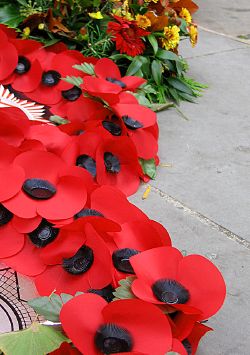Template: Featured article 11 11
From New World Encyclopedia
Revision as of 23:04, 28 March 2014 by Jennifer Tanabe (talk | contribs) (Created page with "{{Main page article box| type=Featured| title=Remembrance Day| image_name=RemembrancePoppies.jpg| image_desc=Wreaths of artificial poppies used as a symbol of reme...")
Featured Article: Remembrance Day
Remembrance Day – also known as Poppy Day, Armistice Day (the event it commemorates) or Veterans Day – is a day to commemorate the sacrifices of members of the armed forces and of civilians in times of war, specifically since the First World War. It is observed on November 11 to recall the end of World War I on that date in 1918—major hostilities were formally ended at the eleventh hour of the eleventh day of the eleventh month of 1918 with the German signing of the Armistice. The holiday is marked by ceremonies at local war memorials, involving the laying of wreaths of poppies on the memorials and two-minutes' silence at 11A.M.
After World War II the name of the holiday was changed to Veterans Day in the United States and to Remembrance Day in countries of the British Commonwealth of Nations and the commemoration extended to include veterans of that and later wars. "Poppy Day" is also a popular term used, particularly in Malta and South Africa, due to the connection of poppies with the day, an association that derives from the poem In Flanders Fields that described poppies growing among the crosses marking the graves of those who died in World War I. On Remembrance Day, public readings of this poem stress our debt to those who lost their lives as well as the importance of honoring their memory in ceremonies that focus on the sacrifice and sorrow of war.
